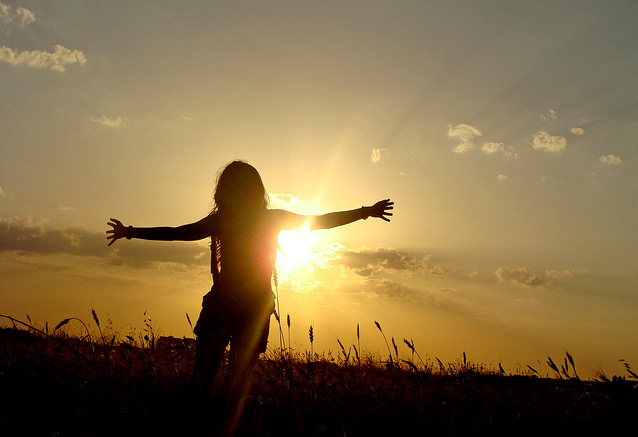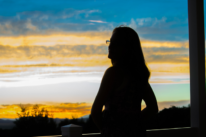
“Life is a process of becoming. A combination of states we have to go through. Where people fail is that they wish to elect a state and remain in it. This is a kind of death.” ~Anais Nin
Normally my girlfriend and I have a routine for Saturday mornings:
She goes to yoga at eleven AM and then heads into Central London to do a small amount of shopping, and perhaps visit a museum. I might get up, do some writing in the morning, tidy the flat, and then take a dance class at 1PM. These are routines we enjoy, or at least enjoy most of the time.
Last Saturday we spontaneously decided to do none of that.
Instead, we went for a walk along a local canal towards central London. It was a mild, hazy morning, with calm water, seagulls, ducks, joggers, quiet, and sun.
We left the canal and visited some inner city churches and their second hand markets, offering cheap coffee and large, silent spaces.
We finished by visiting two different specialty coffee shops. At the end we sat in the second and best, with sun streaming in through the windows, feeling calm and content.
As opposed to our normal Saturdays, there was a natural flow to the morning—perhaps better described as an evolution.
Every decision was spontaneous. Every decision felt natural. Every moment was savored.
I could have spent an hour planning our “intimate time” down to the last degree—but would it have contained the joy and peace that naturally flowed that day?
This is increasingly how I am practicing living my life: with a minimum of routines and plans, allowing the present moment to dictate the future.
I try to stay in touch with the process of becoming. In doing this:
- Decisions come from a deeper, more natural place.
- Life feels harmonious.
- You cling less to plans and routines.
- When circumstances do change, you are better prepared to face them because you do not cling to a desire of how things should be.
- You open yourself up to infinite possibilities.
I don’t want to knock routines completely. They can bring richness, happiness, and comfort. For example, I cherish my early morning coffee grinding.
But clinging on too tightly to routines can be counterproductive because:
- When something strays from our routine we suffer.
- We create routines and make plans to impose some certainty on the future. The future is always uncertain. Therefore, by clinging onto routines we are always setting ourselves up for a fall.
- Routines can be negative as well as positive. By blindly following them we can cause ourselves damage.
- We close ourselves off to fulfilling and exciting possibilities. We can think we are happy living in a certain way, but really we are ignorant of the alternatives.
By clinging onto your routines you can, as Anais Nin says, you elect a state and remain in it, and close yourself off to growth, evolution, and change.
Think about your routines and the way you make plans. How many of your plans actually work out how you planned? How many of your routines do you go through blindly and mechanically?
Yesterday, did you have a plan, and did something unexpected happen?
How many of your major life events—jobs, relationships—have come out of the blue? How many times have you allocated an hour to go shopping, and then taken three, or allocated three hours to go and buy something, and then taken one?
If you are an obsessive planner, try a test: tomorrow, look at your plan, and then at the end of the day see if it worked out.
By becoming aware just how uncertain even the most planned lives are, we can let go of our need to control, learn to be soft, and move with the shifting events.
If you’d like live more in a state of becoming, rather than one of rigid routine and unreliable plans:
1. Experiment with changing one routine at a time.
Start small. Go a different route to work this week. Don’t watch TV for one evening. Order a different meal at the restaurant. See what happens.
2. Minimize your to-do list.
Only aim to do the vital thing that needs to get done. Use the free time to be flexible.
3. If something unexpected interrupts your plan or routine, close your eyes, and consciously focus on a few breaths, in and out.
Understand that no amount of anger can change the event. Accept the event, and roll with it.
4. As much as is possible, leave as many decisions about what you will do on any given day until the day itself arrives.
5. Start to embrace uncertainty.
Learn to see the uncertainty as part of the adventure of life. Next time you find yourself wondering where your career will go, if you will find love or have kids, take some deep conscious breathes and allow yourself to be comfortable with “I don’t know.”
6. Remember: just because a routine is habit that doesn’t mean there are not better, more fulfilling ways of doing things.
7. Be aware that making plans for the future, is at best, a very rough guess at what will happen.
Of course, plans are necessary to an extent. At the time of writing I’m organizing my 30th birthday. Without a time, date, place, and description, no one would know what to do or where to come. For the record I am having a lunch party at my flat and people are bringing food.
But what if my flat flooded? What if the trains broke down and people couldn’t come? What if my oven broke?
I could feel angry that my party had been ruined. Or I could roll with it, and move the party to a park or bar down the road, or a friend’s house, whatever.
By focusing on being present in the moment and accepting life as it comes we get in touch with our own becoming.
By being adaptable to change we become peaceful, because change does not disturb us.
By letting go of routines and plans we let ourselves grow and flourish in exciting, unexpected and amazing ways.
Photo by Beatriz Jiménez
About Ben Craib
Ben Craib is a Writer and Creative Learning Workshop Leader. His blog, MNDFL, is about valuing what's important through keeping things simple and cultivating peace through living in the now. Ben aims to provide a source of inspiration, comfort, and practical advice to help people, himself included, live to their best.













 Though I run this site, it is not mine. It's ours. It's not about me. It's about us. Your stories and your wisdom are just as meaningful as mine.
Though I run this site, it is not mine. It's ours. It's not about me. It's about us. Your stories and your wisdom are just as meaningful as mine. 